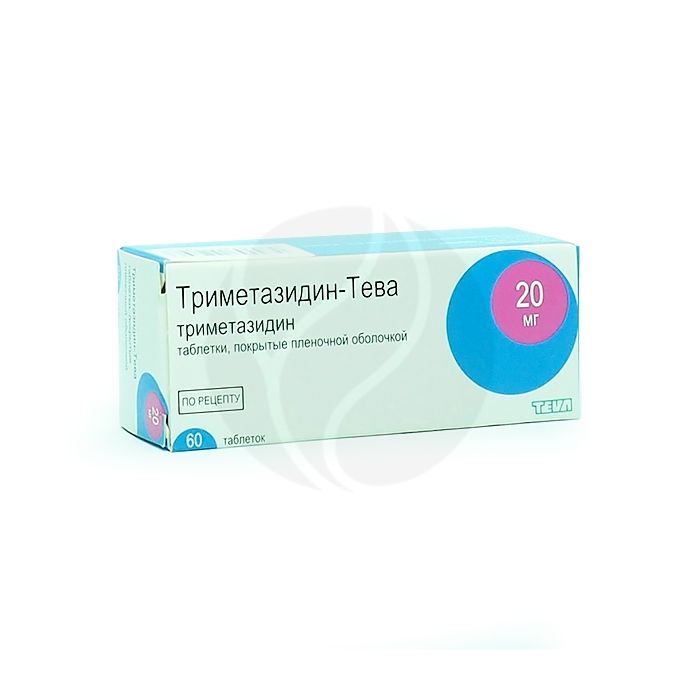Trimetazidine tablets p / o 20mg, No. 60 Teva
Expiration Date: 05/2027
Russian Pharmacy name:
Триметазидин таблетки п/о 20мг, №60 Тева
Ischemic heart disease, prevention of angina attacks (in combination therapy);
Chorioretinal vascular disorders;
Dizziness of vascular origin;
Cochleo-vestibular disorders of an ischemic nature (tinnitus, hearing impairment, Meniere's disease).
Inside, during meals.
The recommended dosage regimen is 1 tablet (20 mg) 2-3 times a day (40-60 mg per day).
The course of treatment is recommended by a doctor.
1 film-coated tablet contains:
Active ingredient: trimetazidine dihydrochloride - 20 mg
Excipients: microcrystalline cellulose - 20 mg, mannitol - 44.5 mg, copolyvidone - 4 mg, colloidal silicon dioxide - 0.5 mg, magnesium stearate - 1 mg.
Shell composition: hypromellose - 2.3 mg, macrogol 6000 (polyethylene glycol) - 0.23 mg, iron dye yellow oxide (E172) - 0.1 mg, titanium dioxide (E171) - 0.49 mg.
Hypersensitivity to any of the components of the drug, including lactose intolerance;
renal failure (creatinine clearance below 15 ml / min);
severe liver dysfunction;
pregnancy;
lactation period;
age up to 18 years (efficacy and safety have not been established).
Trade name of the drug : Trimetazidine
International non-proprietary name : trimetazidine
Dosage form : film-coated tablets.
Composition :
1 film-coated tablet contains:
Active ingredient: trimetazidine dihydrochloride - 20 mg
Excipients: microcrystalline cellulose - 20 mg, mannitol - 44.5 mg, copolyvidone - 4 mg, colloidal silicon dioxide - 0.5 mg, magnesium stearate - 1 mg.
Shell composition: hypromellose - 2.3 mg, macrogol 6000 (polyethylene glycol) - 0.23 mg, iron dye yellow oxide (E172) - 0.1 mg, titanium dioxide (E171) - 0.49 mg.
Description
White film-coated tablets, round, biconvex, two layers are visible in cross-section.
Pharmacotherapeutic group : antihypoxic agent.
ATX code : [—01?¬15]
Pharmacological properties
Pharmacodynamics
Trimetazidine has antianginal, coronary dilating, antihypoxic and hypotensive effects.
By directly affecting the cardiomyocytes and neurons of the brain, it optimizes their metabolism and function. The cytoprotective effect is due to an increase in energy potential, activation of oxidative decarboxylation and rationalization of oxygen consumption (increased aerobic glycolysis and blockade of fatty acid oxidation).
Supports myocardial contractility, prevents a decrease in the intracellular content of adenosine triphosphate and phosphocreatinine. Under conditions of acidosis, it normalizes the functioning of membrane ion channels, prevents the accumulation of calcium and sodium in cardiomyocytes, and normalizes the intracellular content of potassium ions. Reduces intracellular acidosis and increased phosphate levels caused by myocardial ischemia and reperfusion.
It prevents the damaging action of free radicals, preserves the integrity of cell membranes, prevents the activation of neutrophils in the ischemic zone, increases the duration of the electric potential, reduces the release of creatine phosphokinase from cells and the severity of ischemic damage to the myocardium.
With angina pectoris, it reduces the frequency of attacks (the consumption of nitrates decreases), after 2 weeks of treatment, exercise tolerance increases, and blood pressure drops decrease. Improves hearing and results of vestibular tests in patients with pathology of ENT organs, reduces dizziness and tinnitus. In case of vascular pathology of the eye, it restores the functional activity of the retina.
Pharmacokinetics
After administration, trimetazidine is rapidly and almost completely absorbed in the gastrointestinal tract. Bioavailability is 90%. The time to reach the maximum concentration in blood plasma is 2 hours. The maximum concentration after a single dose of 20 mg of trimetazidine is about 55 ng / ml. Communication with plasma proteins - 16%. Easily penetrates histohematogenous barriers. The half-life is 4.5-5 hours. It is excreted by the kidneys (about 60% - unchanged).
Indications for use
Ischemic heart disease, prevention of angina attacks (in combination therapy);
Chorioretinal vascular disorders;
Dizziness of vascular origin;
Cochleo-vestibular disorders of an ischemic nature (tinnitus, hearing impairment, Meniere's disease).
Contraindications
Hypersensitivity to any of the components of the drug, including lactose intolerance;
renal failure (creatinine clearance below 15 ml / min);
severe liver dysfunction;
pregnancy; lactation period;
age up to 18 years (efficacy and safety have not been established).
Method of administration and dosage
Inside, during meals.
The recommended dosage regimen is 1 tablet (20 mg) 2-3 times a day (40-60 mg per day).
The course of treatment is recommended by a doctor.
Side effect
Allergic reactions (itching). Rarely: headache, palpitations; from the gastrointestinal tract - mild dyspeptic symptoms (nausea, vomiting, gastralgia).
Overdose
Currently, no cases of drug overdose have been reported.
Interaction with other medicinal products
Not described.
Special instructions
Against the background of drug treatment in patients with coronary heart disease, there is a significant decrease in the daily requirement for nitrates.
The use of the drug does not affect the ability to drive a car and perform work that requires a high speed of psychomotor reactions.
Release form :
Tablets, film-coated, 20 mg.
On 10 tablets in a blister strip packaging from a film of polyvinyl chloride and printed aluminum foil varnished.
2, 3 or 6 blisters together with instructions for use are placed in a pack.
Storage conditions :
List B.
In a dry, dark place, at a temperature not exceeding 25 ? C.
Keep out of the reach of children.
Expiration date :
2 years.
Do not use after the expiration date.
Terms of dispensing from pharmacies :
Prescription.

